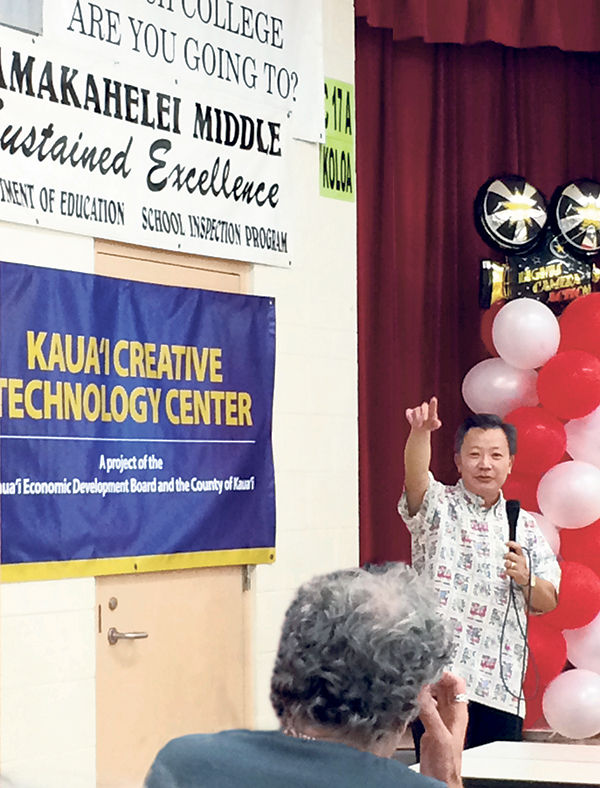LIHUE — A nonprofit technology center for community and commercial use would be good for Kauai, according to a recently completed feasibility study. With a goal to “amplify creativity, catalyze economic growth, and build a stronger community,” the proposed Kauai
LIHUE — A nonprofit technology center for community and commercial use would be good for Kauai, according to a recently completed feasibility study.
With a goal to “amplify creativity, catalyze economic growth, and build a stronger community,” the proposed Kauai Creative Technologies Center (KCTC) is touted as a facility accessible both for independent filmmakers and major studios on location. It would also be a training center for community members to develop marketable skills for opportunities within these industries.
County Economic Development Director George Costa said the proposed project is exciting. The Kauai Economic Development Board indicated strong demand and readiness for it in its Comprehensive Economic Development Strategy report.
“Now, through the strong support of the community, this vision is moving forward,” Costa said. “There is tremendous potential for this center to create jobs and transform our community through digital media, robotics, small business development and entrepreneurship. We are looking forward to the next phase of the project.”
Kauai Film Commissioner Arthur Umezu said the KCTC is necessary with the flurry of Hollywood movies filmed on-island just in the past seven years alone. The projects have fueled additional interest in reality and travel-based television shows, documentaries and other projects along with media produced about these projects and Kauai, that, in turn, attract visitors from around the world.
“The future of Kauai’s film industry will not be fully visualized and attained without adequate technical facilities and qualified local crew support,” Umezu said.
Oahu had the only sound studio in the state for decades until Maui Film Studio opened its full-scale soundstage and studio complex in 2013.
The Big Island will soon open Global Virtual Studio, a trans-media accelerator to empower creative entrepreneurs and filmmakers to tell a story with multiple digital formats.
“The proposed Kauai Creative Technologies Center on Kauai, although not a soundstage or film studio, is a first step to develop a viable ‘film business industry facility,’” Umezu said. “Visiting film crews can incorporate the facility to do pre- and post-production work while filming on Kauai, as well as create a professional working environment for industry professionals to learn and improve their skills.”
KCTC would provide opportunities for film students and others working in digital media at K-12 schools and Kauai Community College, Umezu said. KCTC would capitalize on a growing industry and prepare these creative artists to succeed in the industry right on Kauai.
KEDB spokesperson Marissa Sandblom said KCTC would allow film production crews the space and equipment to do work on-island, and as a place to train locals in those professional roles.
“The feasibility studies show opportunity and need for that type of unit,” Sandblom said.
Alan Tang, president and CEO of Olomana Loomis ISC, was hired by KEDB to conduct the feasibility study. KCTC stakeholders have been passionate from the start, and he said the study was a discovery process for feedback.
“The enthusiasm and support from the community is not surprising but it is heartwarming,” Tang said.
“What really pleased us is the support from the people of Kauai, because they will be the ones to decide if they want it in the end.”
After reviewing the other centers in the state, the study recommended a private nonprofit structure with board oversight to ensure its education and training mission serves the community and business sectors of Kauai, Tang said.
“We saw that as the best method,” Tang said. “With schools and institutions, you are subject to different policies.”
Tang gauged the needs of filmmakers, performing arts circles and the community. He talked extensively with high schools and Kauai Community College to be sure the project is an asset and not a redundancy to what is already in place.
Hoike, Kauai Community Television, teaches community production but is not available for commercial use by law. KCTC would differ by accommodating commercial music and film production.
“Our vision is to be complementary and supplementary to what already exists and it is not our intent to duplicate,” Tang said. “We want to find the right niche.”
There were many ideas but the focus was kept as narrow as possible, Tang said. KCTC is an entity for creativity but it is more than just about media.
In addition to training on professional audio-visual equipment, there could also be instruction on anything from editing software to 3D animation, or occupations involved with location film production support. The equipment is not the same as the simplified equipment for consumer use and becoming certified makes someone marketable for professional work.
“There is quite a robust network of independent producers and we will try to be a resource,” Tang said. “The network is not quite that organized or deep enough yet and we can provide that level of training.”
The pool of local musical talent also indicates a desire for an affordable recording space, Tang said.
“There are a few pocket studios on-island but people want a first-class experience,” he said. “This would mean high-end production of video and audio and a professional recording stage to do music videos and performing arts.”
The challenge will be to make KCTC large enough to contain everything that is wanted. The recommended locations are Lihue or Kapaa. Being close to the airport is also desired to better support the major film studios.
Tang determined that the KCTC should be about 25,000 to 30,000 square feet, and estimated the cost to be between $10 million and $15 million.


